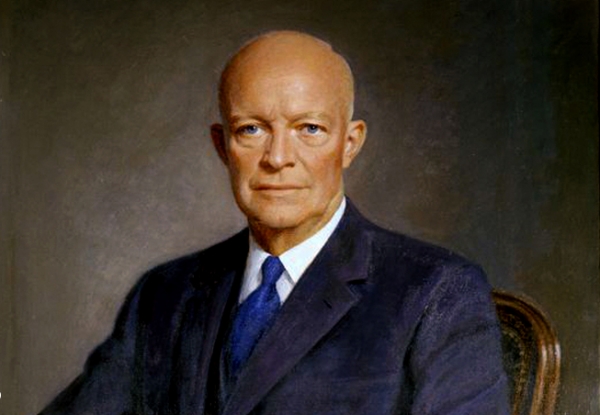By Theresa DeRoberts
Dwight D. Eisenhower, 34th president of the United States between 1953 and 1961, warned of the potential of undue influence by the “military-industrial complex.” His statement was prophetic and delivered with the credibility only a former General of the Army and West Point Graduate could render. Ike recognized that by the middle of the 20th Century, the United States was in a particularly potent position to determine the direction of conflict worldwide, and that her economy would be profoundly intertwined with any form of military growth.
Since the 1950s, the United States has been involved continually in some form of conflict and war, and has consequent industry supporting military endeavors. In addition, the United States has the largest military budget in the world. It is estimated in fact that the United States spends 42% of what the entire world spends on the military.
As a consequence, America has been subject since WWII to a great deal of criticism domestically and abroad regarding her participation in international wars. There are incessant debates about her motives and comprehension of foreign relations. The United States too often seems to appear a nation state determined to control other countries, obtuse to the cultural and ethnic factors of conflict in other regions of the world. In essence, she has been deemed a war machine, driven purely by economic domination, while ignoring the internal welfare of those beyond and within her borders.
Yet, one wonders where we would be at this very moment if the United States decided not to be involved in conflict abroad. US involvement in the Middle East due to the recent activities of Vladamir Putin and the onset of ISIS; the stabbings in Israel; and President Obama’s decision to keep troops in Afghanistan, suggest that deep down in a place we might be loath to acknowledge or visit, there is some reassurance when the United States is involved. We – those in the West along with those under siege, elsewhere – understand that we cannot control ultimately the actions of others. Despite treaties and ceasefires, others will attack and wage war. Who else then to protect the “we” against insurgency and invasion?
Ike taught us a lesson about what the world would be like as of the end of WWII. At that point in history, the United States came out on top, economically and militarily, building an arsenal and momentum as she transitioned from the world war to the Cold War. She codified her position and role as a military leader, while creating an international environment within which her every action would be forever scrutinized.
As Americans we should continue to challenge and question decisions that involve our nation in international conflict. But as Americans we should only do so with some conception of what the world would be like today had we stood by and not entered and stayed in the international arena by the 1940s.

